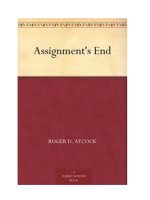Tài liệu U.S. Securities and Exchange Commission “We are the investor’s advocate” pdf
Bạn đang xem bản rút gọn của tài liệu. Xem và tải ngay bản đầy đủ của tài liệu tại đây (60.46 KB, 10 trang )
U.S. Securities and Exchange Commission
“We are the investor’s advocate”
Academic Year 2013-14
Fall 2013 Law Student Observer Program
Expected Washington, DC Program Start Date: September 4, 2013
Applications for Washington, DC accepted on a rolling basis from Jan. 22 to April 19, 2013
Applications recommended by March 22, 2013
Spring 2014 Law Student Observer Program
Expected Washington, DC Program Start Date: January 15, 2014
Applications for Washington, DC accepted on a rolling basis from Aug. 19 to Oct. 18, 2013
Applications recommended by Oct. 4, 2013
See below for how to apply and for deadlines in the regional offices.
The SEC's Law Student Observer Program provides exposure to the workings of the
Commission and to the regulation of securities and securities markets. Students work with
SEC attorneys, accountants and other professionals.
The one-semester volunteer program is open to first-, second-, or third-year law
students, LLM students or joint degree students like “JD/MBA” candidates. In Washington,
interns are hired for 10 divisions and offices. In the regional offices, the SEC staff – and
therefore the interns – works for the Division of Enforcement and/or the Office of Inspections
and Examinations. We ask that interns work at least 10 weeks. We expect interns to commit
a minimum of 15 or 20 hours a week depending on the office and we take many fulltime
interns who work 40-hours per week. In addition to this work commitment, the students in
Washington, DC attend a seminar program, which highlights different aspects of the
Commission. The seminars – which are generally at 3 pm on Wednesdays – are mandatory.
In selecting students, preference will be given to students with excellent academic
backgrounds, professional experience (especially in an industry related to the SEC), and
courses in corporate and securities law. You may arrange academic credit for this program if
offered by your law school.
Applications will be considered and offers will be made on a rolling basis. Do not wait
until the deadline. Once slots are filled, we will not consider later applications.
BASICS ABOUT THE INTERN PROGRAM
Programs are run separately in the Headquarters and each regional office. The start
dates and application dates above are for the Washington, DC program. See below for how to
apply and for deadlines in regional offices.
Student observers are assigned to work with SEC staff members on projects covering
a broad range of the Commission's work. Projects in the past have included the investigation
of industry and issuer practices, litigation of civil enforcement actions and the drafting of
proposed statutes and rules. Students are expected to work at least 15 hours a week and
establish a working schedule with their supervisors.
Although students are not employees of the SEC, they are required to abide by the
rules of the Commission's Conduct Regulations pertaining to, among other things, securities
transactions, conflicts of interest and the confidential nature of information obtained in their
work at the SEC. All offers will be contingent on the students disclosing any affiliations outside
the classroom that they will have during their internship (including jobs, research
assistantships, and other internships) and on a review of the disclosures. For example, it is
highly unlikely that a student would be permitted to participate in the intern program at the
same time she or he works for an entity regulated by the Commission or for a law or
accounting firm that has a securities practice. Students who think their situation may cause a
conflict are encouraged to describe their affiliation in their cover letter to avoid any last-
minute issues.
Students should note that Congress generally prohibits the use of appropriated funds
to employ non-citizens within the United States. That restriction is discussed on the USAJobs
Web site. Students who are not U.S. citizens are eligible for the student observer program.
However, they should recognize that they are generally not eligible to be hired as employees
after graduation.
We have a limited number of slots and cannot hire all of the students who would be
successful interns. Students are welcome to decline our offers. However, students who
accept our offer and then quit – either before or after the program starts – will have taken an
opportunity from another student and will have wasted SEC resources. In certain cases, we
will notify a law school about students who fail to meet professional standards.
BASICS ABOUT THE APPLICATION AND SECURITY CLEARANCE PROCESS
Programs are run separately in the Headquarters and each regional office. The largest
two programs are in the SEC Headquarters in Washington and the New York Regional Office.
In the Headquarters, positions are available in various divisions and offices. Interns are
assigned to a specific division or office and do not rotate. The start dates and application
dates at the top of this page are for the Washington, DC program. See below for information
about the regional offices, including the divisions and offices for which they accept interns,
their application procedures and their application deadlines.
Also see below for information about internship positions with the Office of the
Inspector General, an important office within the SEC whose internships offer hands-on
experience for students pursuing careers in public integrity.
To apply, students should assemble the following documents and read the instructions
below that describe how to apply to the SEC office in different cities:
1. Resume – with a street address, phone number, and email address that will be
good through the start of the program.
2. One-page cover letter
3. Transcript (law school or for first year students, undergraduate)
4. A list of current courses
5. Five- to ten-page legal writing sample
Applications will be considered and offers will be made on a rolling basis. Do not wait
until the deadline. Once slots are filled, we will not consider later applications. In selecting
students, the SEC will consider academic achievement, professional experience, law review
and other journal work, relevant coursework, demonstrated legal research and writing skills,
and interest in public service.
Government-wide changes to the security process have extended the time that the
Commission needs to process security clearances. In our experience, clearances for students
who are not U.S. citizens take longer. Accordingly those students are encouraged to apply as
early as the first weeks of the application window. For Washington DC, those dates are at the
top of this page. All early applicants will have the advantage of early consideration and of an
earlier clearance if they are accepted. There are no guarantees that slots will remain available
for applications submitted in the final weeks.
FREQUENTLY ASKED QUESTIONS AND FURTHER INFORMATION
How do I apply? Read below. There are specific instructions for the Washington DC
Headquarters and some regional offices. For other regional offices, you should mail an
application packet as discussed below.
What are the deadlines? Read below. The deadlines vary slightly between offices.
You should follow the instructions below. Applications will be considered and offers will be
made on a rolling basis. If you wait until the final deadline, all slots may be filled and you will
not be considered.
Do I need to be a student? Yes. You must be enrolled in law school during the
internship. The intern program is not open to people who graduate law school before the
program ends.
Do I need to get credit for my internship? No. Students are eligible whether or not
they are paying their school for credit.
What are the start dates in the regional offices? Each office sets its own start dates.
The Headquarters dates are provided as a guide, but the intern committee in each region will
provide dates to its interns.
Are the start dates firm? In the Headquarters, we want students to start on our
official start date and attend orientation. Generally, we schedule a single early start date for
out-of-town students whose law schools require them to start earlier.
What hours will I work? Interns are expected to work at least 15 or 20 hours a week
depending on the office (and to attend the Wednesday afternoon seminar in the
Headquarters). The hiring committee does not set a work schedule for the interns. Instead,
the interns set their schedules with their supervisor once they start work.
How many weeks do I need to work? In the Headquarters, we require at least 10
weeks of work. We encourage students to work as long as possible, particularly because
attorneys often given more-complex work to interns after they have proven themselves in the
early weeks. An eleventh or twelfth week can lead to exceptional opportunities.
For more information, visit our website: www.sec.gov/jobs.shtml or email Diane Evans
at
HOW TO APPLY TO THE HEADQUARTERS IN WASHINGTON, DC
Fall 2013: Applications Jan. 22 to April 19, 2013. Recommended by March 22, 2013
Spring 2014: Applications Aug. 19 to Oct. 18, 2013. Recommended by Oct. 4, 2013
For positions in Washington, DC, students should apply by email and should follow the
procedure below. Failure to follow these instructions about creating and naming your PDF
may result in you not being considered. These procedures help us the run the program on
limited resources.
Make sure that your cover letter answers the following questions. None of
these questions affect your application. We gather the logistical information
early to avoid later delays and to expedite the security clearance process. Feel
free to just answer the questions in a final paragraph:
o Are you a US citizen? A person with joint citizenship is a US citizen. If
not, what citizenship do you hold?
o Do you use a first name different from your legal first name? For
example, some people have a legal firm name that is Chinese, but
they use an English first name professionally. That’s fine. We just
need you to list your legal first name, your “preferred” first name, and
your family name. This avoids confusion during the security clearance
process.
o What are your top four preferences for offices/divisions to work? The
divisions and offices are listed on the SEC Web site at
Interns learn their assignment on
the first day. Interns are generally placed in Corporation Finance,
Enforcement, Investment Management, RiskFin, Trading and Markets,
Compliance Inspections and Examinations, Ethics, General Counsel,
Inspector General, and International Affairs. Your list should include
at least one or two of CF, ENF, and TM because they hire the most
students.
o Does your law school require you to start before our standard start
date, which is listed at the top of this page? We will set a single early
start date for students required to start early. Generally, they’re about
a week earlier. Students from Washington and Baltimore law schools
start on the standard state date.
o Do you intend to work part time (15-20 hours a week while you take
other classes) or full time (for example as part of a “Semester in DC”
program)?
Create a single PDF with the documents listed above in the order listed
above. The PDF should be named in capitals with your name “LASTNAME
FIRSTNAME.” For example – HOPP JENNIFER.
Send your PDF as an attachment in an email to
The subject line of your email should be “LASTNAME FIRSTNAME SEC intern
application.”
If you cannot create a PDF and want a Headquarters internship, send physical
documents by an overnight or two-night delivery to Diane Evans at the
Washington DC address on the SEC Web site. In your cover letter, please
explain how you attend law school and do not have access to a scanner.
We recommend that you not send anything to the Headquarters by first class mail
because they are delayed and irradiated as part of the government mail system.
HOW TO APPLY TO THE NEW YORK REGIONAL OFFICE
Fall 2013: Applications Jan. 22 to April 19, 2013 (recommended by March 22).
Spring 2014: Applications Aug. 19 to Oct. 18, 2013 (recommended by Oct. 4).
Positions for the Law Student Observer Program in the New York Regional Office
(NYRO) are limited to the Division of Enforcement. Positions are available in both Enforcement
generalist units and in several specialized Enforcement units. In particular, the Asset
Management Unit - which focuses on violations involving investment advisers, hedge funds,
mutual funds and private equity funds - typically has a number of interns in the New York
office.
The program is open to second- and third-year law students, JD/MBA students, and
LLM students. Program interns work directly with Enforcement attorneys and are expected to
commit a minimum of 15 hours per week, for at least 10 weeks, to the program. You may
arrange for academic credit for this program if it is offered by your law school. We welcome
and encourage applications from students, whether local or out-of-state, seeking full-time
externships for the semester. The position is unpaid.
Applications will be considered and offers will be made on a rolling basis. In selecting
students, NYRO will consider academic achievement, professional experience, relevant
coursework, and demonstrated legal research and writing skills.
A PUBLIC INTEGRITY UNIT WITHIN SEC HEADQUARTERS
Although most SEC attorneys work day-to-day in securities regulation, many
attorneys deal with other substantive areas. The Commission highlights an office that
may interest students who would like to pursue careers dealing with public integrity: the
Office of Inspector General. The OIG reports directly to the Chairman, and it hires interns
each semester. The Commission encourages applications because the OIG serves an
important mission and because it provides interns with hands-on educations.
Students interested in the OIG should apply to the Headquarters using the
procedure described above and highlight their preference in their cover letter.
The Office of Inspector General is an independent office within the SEC that
conducts audits of agency operations and investigations into allegations of misconduct by
staff or contractors. The Office’s mission is to detect fraud, waste, and abuse, and to
promote integrity, economy, efficiency and effectiveness. The Office of Inspector General
has two primary components: audits and investigations.
Interning in the Office of Inspector General provides law students with hands-on
experience involving a wide variety of issues and a unique opportunity to obtain exposure
to the various divisions and offices of the Commission. Students interning in the Office of
Inspector General may be assigned to assist both the audit and investigations units of the
Office. Interns working with auditors typically attend interviews, prepare memoranda
summarizing those interviews, assist in conducting audit testing, and may also draft
portions of audit reports. Interns assisting the Office’s investigators generally participate
in witness interviews and testimonies, conduct document and e-mail review, and may
draft portions of investigative reports. Students also are often requested to perform legal
research assignments related to various aspects of the Office’s work and responsibilities.
If you would like to learn additional information about OIG, please visit www.sec-
oig.gov or Roberta Raftovich, Assistant to the Inspector General, at 202-551-5399.
To apply, students should submit a cover letter, resume, (unofficial) transcript, and a
writing sample. The materials should be combined into a single PDF, which should be named
in capitals with your name “LASTNAME FIRSTNAME.” For example – HOPP JENNIFER. Do not
add any additional words or punctuation to the file name. Applications that do not comply
with this procedure may not be considered.
In your cover letter, please indicate whether you are applying for a part-time or
fulltime position. If you are not a U.S. citizen, please note as such, and provide your country
of citizenship. (A person with joint citizenship is a U.S. citizen.) Your citizenship status will
not affect your application; we ask to expedite the security clearance process.
Send your PDF application as an attachment in an email to
Please provide the following information in your email (even
if it is also in the PDF): 1) your full name, 2) the semester and year for which you’re applying,
3) whether you are applying for a full or part-time internship, 4) your phone number, 5) your
email address, and 6) whether you are interested in being considered for the general
Enforcement internships, the Asset Management Unit internships, or both.
HOW TO APPLY TO THE ATLANTA REGIONAL OFFICE
Fall 2013: Applications Jan. 22 to April 19, 2013.
Spring 2014: Applications Aug. 19 to Oct. 18, 2013.
Positions for the Law Student Observer Program in the Atlanta Regional Office (ARO)
are limited to the Division of Enforcement. The program is open to law students and JD/MBA
students. Program interns work directly with Enforcement attorneys and are expected to
commit a minimum of 15 hours per week, for at least 10 weeks, to the program. You may
arrange for academic credit for this program if it is offered by your law school. We welcome
and encourage applications from students, whether local or out-of-state, seeking fulltime
externships for the semester. The position is unpaid.
Applications will be considered and offers will be made on a rolling basis. In selecting
students, ARO will consider academic achievement, professional experience, law review and
other journal work, relevant coursework, demonstrated legal research and writing skills, and
interest in public service.
To apply, students should submit a cover letter, resume, (unofficial) transcript, and a
writing sample to The subject line should include the semester and year
that you’re applying, such as “Fall [YEAR] Intern Application” or “Spring [YEAR] Intern
Application.”
HOW TO APPLY TO THE BOSTON REGIONAL OFFICE
Fall 2013: Applications Jan. 22 to April 19, 2013.
Spring 2014: Applications Aug. 19 to Oct. 18, 2013.
Positions for the Law Student Observer Program in the Boston Regional Office (BRO)
are limited to the Division of Enforcement. The program is open to second- and third-year law
students, JD/MBA students, and LLM students. Program interns work directly with
Enforcement attorneys, and are expected to commit a minimum of 15 hours per week, for at
least 10 weeks, to the program. You may arrange for academic credit for this program if it is
offered by your law school. We welcome and encourage applications from students, whether
local or out-of-state, seeking fulltime externships for the semester. The position is unpaid.
Applications will be considered and offers will be made on a rolling basis. In selecting
students, BRO will consider academic achievement, professional experience, relevant
coursework, and demonstrated legal research and writing skills.
To apply, students should submit a cover letter, resume, (unofficial) transcript, and a
writing sample to The subject line should include the semester and year
that you’re applying, such as “Fall [YEAR] Intern Application” or “Spring [YEAR] Intern Application.” If you
have any questions about the program, please direct them to the same email address.
In your cover letter, please indicate whether you are applying for a part-time or
fulltime position. If you are not a U.S. citizen, please note as such, and provide your country
of citizenship. (A person with joint citizenship is a U.S. Citizen.) Your citizenship status will
not affect your application; we ask to expedite the security clearance process.
HOW TO APPLY TO THE CHICAGO REGIONAL OFFICE
Fall 2013: Applications Jan. 22, 2013 to April 12, 2013.
Applications are recommended by March 22, 2013.
Spring 2014: Applications Aug. 19, 2014 to Oct. 4, 2013.
Applications are recommended by September 20, 2013.
Law Student Observer Program positions in the Chicago Regional Office (CHRO) are
offered in the Enforcement Division. The program is open to second and third year law
students and JD/MBA. Program externs work directly with Enforcement attorneys and are
required to commit to a minimum of 15 hours per week, for at least 10 weeks, we do not offer
full-time positions during school year. Students are encouraged to arrange for academic
credit for this program if it is offered by their school. This is an unpaid position.
To apply, students should submit a cover letter, resume, (unofficial) law school
transcript and 5-10 page writing sample unless it is a published article, to
The subject line should include the semester and year that you are
applying for, e.g., “Fall [YEAR] Intern Application. Any questions should be sent to the same
email address. Applications are considered and offers extended on a rolling basis. Students
are selected based on academic achievement, relevant course work, professional experience,
and demonstrated legal research and writing skills. This is a highly competitive program.
In your cover letter, please indicate if you are not a U.S. citizen, please note as such,
and provide your country of citizenship. Your citizenship status will not affect your
application; we ask to expedite the security clearance process. Please note all selected
candidates must clear Homeland Security and FBI background checks.
HOW TO APPLY TO THE DENVER REGIONAL OFFICE
Fall 2013: Applications Jan. 22 to April 19, 2013.
Spring 2014: Applications Aug. 19 to Oct. 18, 2013.
Positions for the Law Student Observer Program in the Denver Regional Office (DRO)
are limited to the Division of Enforcement. The program is open to second-year and third-year
law students, JD/MBA students, and LLM students. Program interns work directly with
Enforcement attorneys and are expected to commit a minimum of 15 hours per week, for at
least 10 weeks, to the program. You may arrange for academic credit for this program if it is
offered by your law school. We also welcome applications from students, whether local or out-
of-state, seeking fulltime externships for the semester. The position is unpaid.
Applications will be considered and offers will be made on a rolling basis. In selecting
students, DRO will consider academic achievement, professional experience, demonstrated
legal research and writing skills, and an interest in public service work.
To apply, students should submit a cover letter, resume, (unofficial) transcript, and a
writing sample to The subject line should include the semester and year
that you’re applying, such as “Fall [YEAR] Intern Application” or “Spring [YEAR] Intern
Application.” If you have any questions about the program, please direct them to the same
email address.
In your cover letter, please indicate:
That you are applying for an internship in the DRO (it is fine if you are
applying to multiple offices, but please at least indicate that you would like to
be considered for a position in the DRO);
Whether you are applying for a part-time or fulltime position; and
If you are not a U.S. citizen, please note as such, and provide your country of
citizenship. (A person with joint citizenship is a U.S. Citizen.) Your citizenship
status will not affect your application; we ask to expedite the security
clearance process.
HOW TO APPLY TO THE FORT WORTH REGIONAL OFFICE
Fall 2013: Applications Jan. 22 to April 19, 2013.
Spring 2014: Applications Aug. 19 to Oct. 18, 2013.
Available positions in the Fort Worth Regional Office (FWRO) include internships in the
Division of Enforcement as well as in Regulation. Enforcement positions are open to second-
and third-year law students, JD/MBA students, and LLM students. Enforcement interns work
directly with Enforcement attorneys. Regulation interns are limited to MBA students. These
positions work directly with Examination staff in support of the office’s examination program of
registered investment advisers, investment companies, and broker-dealers. All interns are
expected to commit a minimum of 15 hours per week, for at least 10 weeks, to the program.
You may arrange for academic credit for this program if it is offered by your school. The
positions are unpaid.
In selecting students, FWRO will consider academic achievement, professional
experience, relevant coursework, and demonstrated research and writing skills.
To apply, students should submit a cover letter, resume, (unofficial) transcript, and a
writing sample to The subject line should include the semester and
year that you’re applying, such as “Fall [YEAR] Intern Application” or “Spring [YEAR] Intern
Application.” If you have any questions about the program, please direct them to the same
email address.
In your cover letter, please indicate whether you are a U.S. citizen. If you are not a
U.S. citizen, please provide your country of citizenship. (A person with joint citizenship is a
U.S. Citizen.) Your citizenship status will not affect your application; we ask to expedite the
security clearance process.
HOW TO APPLY TO THE MIAMI REGIONAL OFFICE
Fall 2013: Applications Jan. 22 to April 19, 2013.
Spring 2014: Applications Aug. 19 to Oct. 18, 2013.
Positions for the Law Student Observer Program in the Miami Regional Office (MIRO)
are limited to the Division of Enforcement. The program is open to second- and third-year law
students, JD/MBA students, and LLM students. Program interns work directly with Enforcement
attorneys and are expected to commit a minimum of 15 hours per week, for at least 10
weeks, to the program. You may arrange for academic credit for this program if it is offered by
your law school. We welcome and encourage applications from students, whether local or out-
of-state, seeking fulltime externships for the semester. The position is unpaid.
Applications will be considered and offers will be made on a rolling basis. In selecting
students, MIRO will consider academic achievement, professional experience, relevant
coursework, and demonstrated legal research and writing skills.
To apply, students should submit a cover letter, resume, (unofficial) transcript, and a
writing sample to The subject line should include the semester and year
that you’re applying, such as “Fall [YEAR] Intern Application” or “Spring [YEAR] Intern
Application.” If you have any questions about the program, please direct them to the same
email address. In your cover letter, please indicate whether you are applying for a part-time
or fulltime position. If you are not a U.S. citizen, please note as such, and provide your
country of citizenship. (A person with joint citizenship is a U.S. Citizen.) Your citizenship status
will not affect your application; we ask to expedite the security clearance process.
HOW TO APPLY TO THE SALT LAKE CITY REGIONAL OFFICE
Fall 2013: Applications Jan. 22 to April 19, 2013.
Spring 2014: Applications Aug. 19 to Oct. 18, 2013.
Positions for the Law Student Observer Program in the Salt Lake Regional Office
(SLRO) are limited to the Division of Enforcement. The program is open to second- and third-
year law students, JD/MBA students, and LLM students. Program interns work directly with
Enforcement attorneys and are expected to commit a minimum of 20 hours per week, for at
least 10 weeks, to the program. You may arrange for academic credit for this program if it is
offered by your law school. We also welcome and encourage applications from students,
whether local or out-of-state, seeking full-time internships for the semester. The positions are
unpaid.
Applications will be considered and offers will be made on a rolling basis. In selecting
students, SLRO will consider academic achievement, professional experience, relevant
coursework, and demonstrated legal research and writing skills.
To apply, students should submit a cover letter, resume, (unofficial) transcript, and
writing sample to The subject line should include the semester and year
that you’re applying, such as “Fall [YEAR] Intern Application” or “Spring [YEAR] Intern
Application.” If you have any questions about the program, please direct them to the same
email address.
In your cover letter, please indicate whether you are applying for a part-time or full-
time position. If you are not a U.S. citizen, please note as such, and provide your country of
citizenship. (A person with joint citizenship is a U.S. citizen.) Your citizenship status will not
affect your application; we ask to expedite the security clearance process.
HOW TO APPLY TO THE SAN FRANCISCO REGIONAL OFFICE
Fall 2013: Applications Jan. 22 to April 19, 2013.
Spring 2014: Applications Aug. 19 to Oct. 18, 2013.
Positions for the Law Student Observer Program in the San Francisco Regional Office
(SFRO) are limited to the Division of Enforcement. The program is open to second- and third-
year law students, JD/MBA students, and LLM students. Program interns work directly with
Enforcement attorneys and are expected to commit a minimum of 15 hours per week, for at
least 10 weeks, to the program. You may arrange for academic credit for this program if it is
offered by your law school. We also welcome and encourage applications from students,
whether local or out-of-state, seeking full-time internships for the semester. The positions are
unpaid.
Applications will be considered and offers will be made on a rolling basis. In selecting
students, SFRO will consider academic achievement, professional experience, relevant
coursework, and demonstrated legal research and writing skills.
To apply, students should submit a cover letter, resume, (unofficial) transcript, and
writing sample to with the subject line “Spring 2013 Law Student
Observer Program Application.” If you have any questions about the program, please direct
them to the same email address.
In your cover letter, please indicate whether you are applying for a part-time or full-
time position. If you are not a U.S. citizen, please note as such, and provide your country of
citizenship. (A person with joint citizenship is a U.S. citizen.) Your citizenship status will not
affect your application; we ask to expedite the security clearance process.
HOW TO APPLY TO THE OTHER REGIONAL OFFICES
For positions in regional offices not listed above, send applications directly to the office
in which you are interested, Attn: Law Student School Year Internship Coordinator. The
addresses are on the SEC Web site at Regional
offices generally have staff working on enforcement or examination issues.









